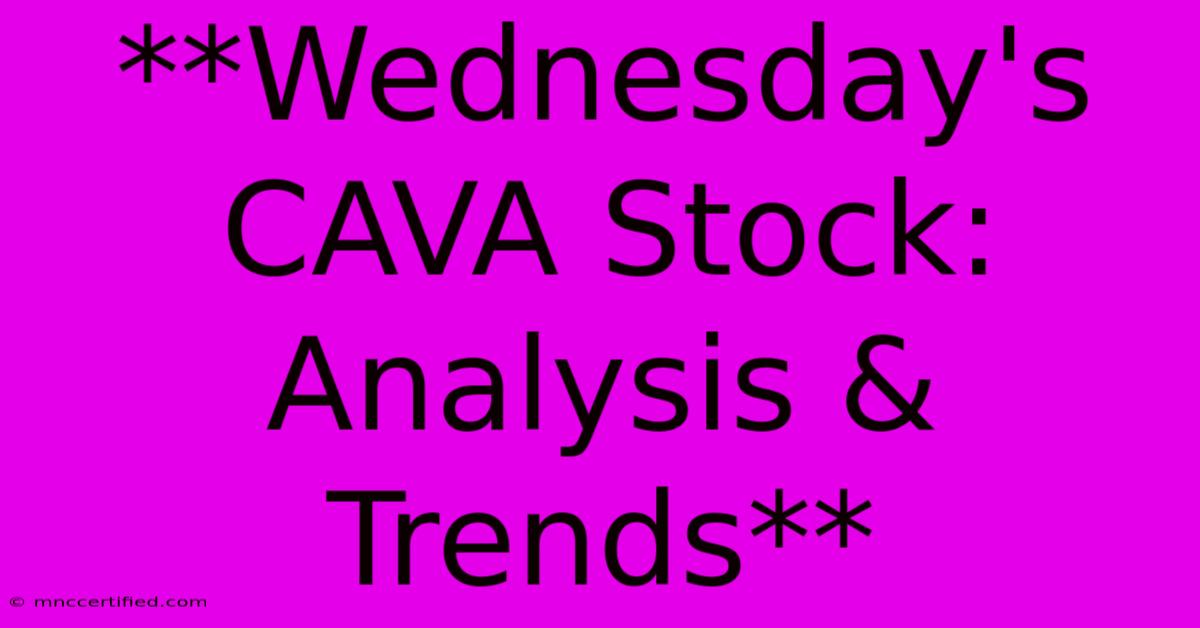**Wednesday's CAVA Stock: Analysis & Trends**

Table of Contents
Wednesday's CAVA Stock: Analysis & Trends
CAVA Group, Inc. (CAVA), the fast-casual Mediterranean restaurant chain, has made a splash since its highly anticipated IPO. Understanding Wednesday's CAVA stock performance requires analyzing recent trends, market sentiment, and key financial indicators. This article delves into a comprehensive analysis, providing insights for investors interested in CAVA's stock trajectory.
CAVA Stock Performance on Wednesdays: A Closer Look
Analyzing CAVA's stock performance specifically on Wednesdays requires access to historical stock data. Unfortunately, predicting daily fluctuations with certainty is impossible. Stock prices are influenced by a multitude of factors, including overall market trends, news announcements (both company-specific and broader economic news), investor sentiment, and even unforeseen events. To get a true picture of Wednesday's performance, you'd need to consult a reputable financial website like Yahoo Finance, Google Finance, or Bloomberg to view the specific daily chart for the relevant Wednesday.
Key Factors Influencing CAVA Stock Price
Several key factors significantly impact CAVA's stock price. Understanding these is crucial for any investor considering a position:
1. Financial Performance:
- Revenue Growth: Consistent and robust revenue growth is a strong indicator of a healthy and expanding business. Investors closely watch quarterly and annual earnings reports for signs of strong performance. Look for metrics like comparable restaurant sales growth and overall revenue expansion.
- Profitability: Moving beyond revenue, profitability is paramount. Investors analyze metrics like gross margin, operating margin, and net income to assess the company's ability to generate profit from its operations. A consistently profitable company tends to attract more investor interest.
- Unit Growth: The expansion of CAVA restaurants is a key driver of future revenue. Investors monitor the pace of new restaurant openings and the performance of these new locations.
2. Market Sentiment and Competitive Landscape:
- Investor Confidence: Positive news and strong financial results generally boost investor confidence, leading to higher demand and a rising stock price. Conversely, negative news or disappointing performance can lead to sell-offs.
- Competition: CAVA operates in a competitive fast-casual restaurant market. Analyzing the competitive landscape – including the strategies of competitors like Sweetgreen and Chipotle – is crucial for assessing CAVA's market position and future prospects.
- Economic Conditions: Broader economic conditions, such as inflation and consumer spending patterns, significantly impact the restaurant industry. Economic downturns can lead to decreased consumer spending, affecting CAVA's sales.
3. News and Announcements:
- Company News: Any news related to CAVA, such as new menu items, marketing campaigns, strategic partnerships, or executive changes, can influence investor sentiment and the stock price.
- Industry News: News and trends within the restaurant industry as a whole can also affect CAVA's stock price.
- Analyst Ratings: Follow the ratings and price target changes from financial analysts covering CAVA. These ratings can provide insights into the broader market's outlook on the company.
How to Analyze Wednesday's CAVA Stock Performance (and any day!)
To thoroughly analyze CAVA's stock performance on any given Wednesday (or any day), follow these steps:
- Consult Financial Websites: Use reputable financial websites to access historical stock data, charts, and news related to CAVA.
- Review Financial Statements: Examine CAVA's quarterly and annual reports to understand its financial performance.
- Analyze Industry Trends: Stay updated on news and trends impacting the restaurant industry.
- Consider Market Conditions: Assess the overall market conditions and their potential impact on CAVA's stock.
- Read Analyst Reports: Seek out and review analyst reports and ratings to gain insights from industry experts.
Disclaimer:
This article provides general information and should not be considered financial advice. Investing in stocks involves risk, and you could lose money. Always conduct your own thorough research and consider consulting with a qualified financial advisor before making any investment decisions. Past performance is not indicative of future results.

Thank you for visiting our website wich cover about **Wednesday's CAVA Stock: Analysis & Trends** . We hope the information provided has been useful to you. Feel free to contact us if you have any questions or need further assistance. See you next time and dont miss to bookmark.
Featured Posts
-
State Farm Insurance Summerville Sc
Nov 14, 2024
-
Donate To Pangolin Pup Care This Giving Tuesday
Nov 14, 2024
-
Insurance Industry Conferences 2024
Nov 14, 2024
-
Life Insurance For Dialysis Patients
Nov 14, 2024
-
Koreasat 6 A Successful Satellite Launch
Nov 14, 2024